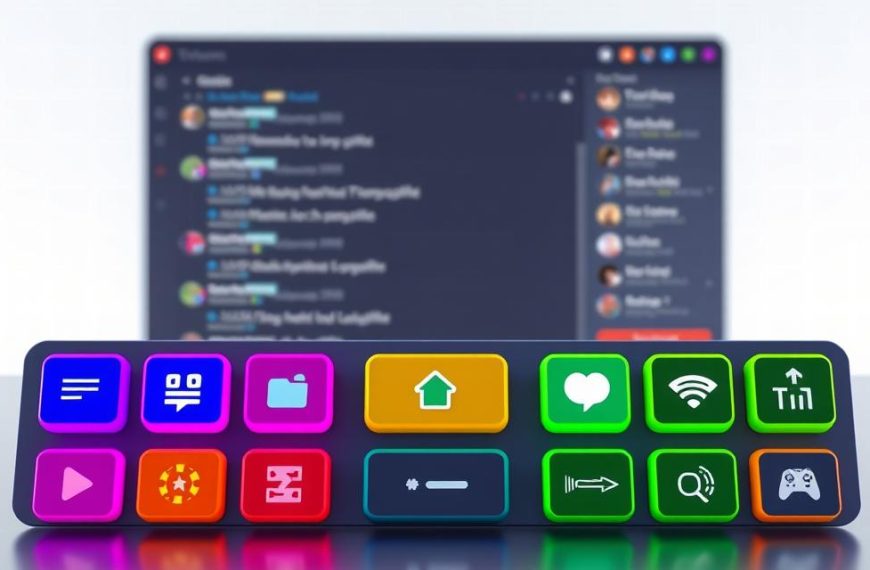Forward-thinking companies across the UK are embracing artificial intelligence to revolutionise their marketing strategies. Brands like Shopify, Instacart, and Airbnb now rely on intelligent tools to analyse customer behaviour, automate campaigns, and deliver hyper-personalised experiences. With 60% of small and medium enterprises already adopting these technologies, organisations ignoring this shift risk losing ground in competitive markets.
Modern marketing teams benefit from AI-driven solutions that handle repetitive tasks while enhancing creativity. From generating targeted content to optimising social media schedules, these systems enable businesses to focus on strategic decision-making. Advanced algorithms can predict consumer trends weeks in advance, allowing brands to stay ahead of demand curves.
This guide explores practical applications transforming UK marketing landscapes. Discover how predictive analytics refine audience targeting and why chatbots improve customer satisfaction rates. Learn to select tools that align with specific operational needs without exceeding budgets.
Whether streamlining email campaigns or analysing competitor strategies, intelligent systems provide measurable improvements in engagement and ROI. For UK businesses prioritising growth, mastering these tools isn’t optional – it’s essential for sustainable success in digital markets.
Introduction to AI in Marketing
UK marketers now leverage AI-driven tools to transform customer engagement strategies. These platforms integrate with existing workflows through protocols like MCP, enabling teams to automate tasks while maintaining brand consistency. Unlike early machine learning systems, modern solutions understand context and adapt to real-time data shifts.
Evolution of AI in the Marketing Landscape
Marketing technology has progressed through three distinct phases:
| Era | Technology | Key Capabilities |
|---|---|---|
| 2010-2015 | Basic algorithms | Demographic targeting |
| 2016-2020 | Predictive analytics | Behaviour pattern recognition |
| 2021-present | LLM-powered systems | Context-aware interactions |
Today’s tools combine generative content creation with predictive trend analysis. This dual approach allows brands like Boots UK to personalise offers while forecasting inventory needs.
Why AI Matters for Modern Businesses
Organisations adopting these solutions report 37% faster campaign deployment according to recent Ofcom studies. The strategic advantages extend beyond simple automation:
- Real-time adaptation to market shifts
- Scaled personalisation across channels
- Data-driven decision frameworks
“AI doesn’t replace human creativity – it amplifies our capacity to deliver relevant experiences at speed.”
This technological shift enables smaller UK firms to compete with enterprise-level resources. By harnessing intelligent systems, businesses optimise budgets while deepening customer connections.
The Rise of AI Marketing Tools in 2025
Industry priorities have shifted dramatically as 78% of UK marketing departments now allocate over 30% of budgets to intelligent systems. Salesforce research confirms artificial intelligence integration tops strategic agendas, with predictive and generative tools driving measurable improvements in campaign efficiency.
Trends and Predictions for AI Integration
Current adoption patterns reveal a split between content creation and behavioural analysis. Over half of ecommerce teams employ generative tools for campaign development, while 53% utilise predictive models for hyper-targeted promotions. This dual approach addresses both creative scalability and precision targeting.
Three critical developments dominate 2025’s landscape:
- Real-time campaign adjustments using live data streams
- Cross-platform personalisation at individual customer level
- Automated compliance checks for UK advertising standards
“Every employee should explore how these systems enhance their workflows – resistance risks obsolescence.”
Insights from Leading Brands
Major players demonstrate the transformative power of intelligent marketing infrastructure. Shopify Magic’s AI suite reduced content production costs by 42% while maintaining engagement rates. Instacart’s predictive algorithms now forecast regional demand spikes with 89% accuracy.
Airbnb’s recent overhaul exemplifies strategic AI adoption. Their systems analyse property images and descriptions to automatically match listings with ideal travellers. This approach increased conversion rates by 31% within six months.
These implementations prove that data-led strategies deliver competitive advantages. Early adopters report 2.3x faster decision-making cycles and 18% higher customer retention compared to traditional methods.
How can i use ai to market my business
Modern enterprises thrive by converting raw information into actionable strategies. At the core of this transformation lies data analysis – the engine powering everything from campaign adjustments to product development. Intelligent systems now handle tasks that previously consumed 60% of marketing teams’ time, according to recent Ofcom research.
Understanding AI-Driven Processes
These systems excel at scanning millions of social interactions, reviews, and search patterns within minutes. Retail giants like Marks & Spencer leverage such capabilities to track competitor pricing shifts and emerging consumer preferences. One campaign manager noted:
“Our algorithms detect regional demand spikes three days faster than manual analysis – that’s the difference between capitalising on trends and chasing them.”
Key applications include automated SEO content generation and video editing workflows. Platforms like Canva’s Magic Studio demonstrate how creative processes benefit from machine learning, producing branded visuals while maintaining consistency across channels.
For customer retention, predictive models analyse purchase histories to personalise email sequences. This approach helped a UK fashion retailer boost repeat sales by 29% last quarter. The technology also streamlines ad creation, testing multiple variants simultaneously to identify top performers.
By delegating repetitive tasks to intelligent tools, teams refocus on strategic initiatives. This shift enables businesses to maintain agility in fast-moving markets while deepening audience connections through data-led insights.
Using AI for Social Media and Website Chat
Immediate customer engagement defines success in today’s digital marketplace. Research shows 90% of UK consumers prioritise instant responses when contacting brands. Modern solutions meet this demand through intelligent systems that blend efficiency with personalisation.
Automated Website Chats and AI Agents
Advanced chatbots now resolve 90% of service queries within ten interactions. These systems analyse customer intent using natural language processing, delivering accurate responses or escalating complex issues. A leading UK retailer reported 68% faster resolution times after implementing such tools.
| Feature | Traditional Chat | AI-Driven Chat |
|---|---|---|
| Response Time | 2-5 minutes | Instant |
| Query Resolution | Basic FAQs | Complex Scenarios |
| Brand Consistency | Variable | Centralised Guidelines |
Sophisticated agents adapt communication styles to match individual preferences. This maintains brand voice while creating authentic interactions that build trust.
Social Media Content Generation and Monitoring
Maintaining active social media presence challenges resource-strapped teams. Intelligent tools generate platform-specific posts, suggesting hashtags and optimal posting schedules. One beauty brand achieved 41% higher engagement using AI-curated Instagram content.
Real-time monitoring tracks brand mentions and sentiment across networks. These systems alert teams to emerging trends or potential crises. Combined with behavioural analysis, they enable proactive campaign adjustments that resonate with target audiences.
“Our social engagement tripled after implementing AI content tools – now we focus on strategic community building.”
Enhancing Content Creation and Optimisation with AI
Modern content demands now require speed and precision that traditional methods struggle to deliver. Intelligent systems bridge this gap by combining creative ideation with technical rigour. Brands achieve 43% faster production cycles while maintaining editorial standards, according to recent UK marketing surveys.
AI Copywriting and Content Drafting
Platforms like Jasper AI revolutionise writing workflows by generating email campaigns and product descriptions in brand-specific tones. These tools analyse existing materials to ensure consistency across all outputs. A skincare company reported producing 120 product pages monthly with just two team members – a task previously requiring six staff.
Brandwell (formerly Content at Scale) addresses authenticity concerns. Its long-form articles pass AI detectors 83% of the time by mimicking human phrasing patterns. One publisher noted:
“Our blog traffic increased by 31% without sacrificing factual accuracy.”
Optimising Blogs and Landing Pages
Surfer SEO transforms content creation into a science. The tool cross-references top-performing pages, suggesting optimal keyword distribution and header structures. Marketing teams use these insights to craft landing pages that convert 22% better than manually optimised versions.
Three critical enhancements drive results:
- Real-time readability scoring during writing
- Competitor gap analysis for strategic keyword targeting
- Automated meta description generation
These systems enable UK businesses to maintain regular blog schedules while adhering to technical SEO requirements. The combination of speed and precision helps brands scale their content strategies without compromising quality.
Leveraging AI for Data-Driven Marketing Insights
Data now fuels over 70% of strategic decisions in UK marketing departments, with intelligent systems transforming raw numbers into actionable strategies. These solutions identify patterns human analysts might overlook, delivering precise recommendations for campaign adjustments and budget allocations.
Analysing Competitor and Customer Data
Modern platforms process CRM records, social signals, and purchase histories to map customer journeys with unprecedented detail. One UK telecom provider increased upsell conversions by 33% after implementing AI-driven segmentation based on service usage patterns and support interactions.
| Metric | Traditional Analysis | AI-Powered Insights |
|---|---|---|
| Data Processing Speed | 2-3 weeks | 48 hours |
| Customer Segments | 5-7 groups | 20+ micro-segments |
| Competitor Monitoring | Monthly reports | Real-time alerts |
These systems excel at spotting market shifts before they trend. A fashion retailer using AI marketing analytics detected rising demand for sustainable materials three weeks ahead of competitors, securing prime inventory positions.
“Our AI models predict customer lifetime value with 87% accuracy – that’s revolutionised how we allocate retention budgets.”
Real-time competitor tracking provides equally valuable insights. Tools automatically compare pricing strategies, promotional calendars, and content performance across rival brands. This enables teams to adjust campaigns while maintaining compliance with UK advertising standards.
Personalised Email Campaigns and Automated Follow-Ups
British brands achieve 58% higher open rates through intelligent email strategies that adapt to individual preferences. Unlike generic blasts, AI-powered systems craft messages reflecting each recipient’s unique journey. This approach builds relevance while maintaining brand consistency across thousands of simultaneous communications.
Strategies for Customised Email Marketing
Modern platforms analyse browsing patterns and purchase histories to predict what content resonates. For abandoned carts, algorithms trigger tailored reminders with dynamic product images. Luxury skincare brand Tata Harper boosted conversions by 41% using AI-optimised sign-up forms that tested 20 variations simultaneously.
| Feature | Traditional Email | AI-Driven Campaign |
|---|---|---|
| Testing Capacity | 2 variants | 20+ variations |
| Personalisation Depth | Name insertion | Behaviour-based offers |
| Response Time | 48-hour cycles | Real-time adjustments |
Automation Tools for Lead Nurturing
Sophisticated systems like Klaviyo AI manage complex sequences without manual input. These tools track engagement metrics to determine optimal send times and content formats. One UK retailer reduced unsubscribes by 29% while doubling click-through rates through predictive send scheduling.
“Our team now focuses on creative storytelling while machines handle the heavy lifting of segmentation and timing.”
AI-Powered SEO Strategies for British Businesses
Search engine optimisation enters a new era as British companies harness intelligent systems to dominate organic rankings. Cutting-edge platforms now automate labour-intensive processes, from keyword mapping to technical audits, delivering measurable improvements in visibility and traffic.
Automating Keyword Research and SERP Analysis
Modern tools like Surfer’s SERP Analyzer employ natural language processing to evaluate top-ranking pages. These systems assess emotional sentiment towards target terms, identifying whether competitors frame keywords positively or critically. Ahrefs’ AI-driven Explorer matches search phrases with user intent, prioritising high-opportunity terms.
Three critical advantages emerge:
- Automated gap analysis revealing untapped content opportunities
- Real-time tracking of ranking fluctuations across devices
- Predictive modelling for algorithm updates
| Task | Traditional SEO | AI-Driven Approach |
|---|---|---|
| Keyword Research | 4-6 hours weekly | 15-minute automated reports |
| Technical Audits | Manual code checks | Schema generation in seconds |
| Localisation | Basic hreflang tags | AI-optimised geo-targeting |
“Our organic traffic grew 67% after implementing AI tools – they uncover opportunities our team simply couldn’t spot manually.”
These systems generate compliant schema markup and international hreflang tags while analysing content performance across regions. For UK firms targeting global markets, this precision ensures search visibility aligns with local search behaviours.
Creative Support: AI Image and Video Generation Tools
Visual storytelling now drives engagement in digital marketing, with intelligent systems reshaping how brands produce imagery and video. A 2024 Klaviyo study reveals 36% of UK ecommerce teams employ AI image generation, while 30% automate copywriting. These solutions bridge the gap between creative vision and practical execution.
Designing Blog Thumbnails and Social Media Graphics
Platforms like Midjourney and Adobe Firefly transform text prompts into polished visuals. Marketing teams input campaign themes to generate brand-aligned assets within minutes. Lexica Art specialises in hyper-realistic product shots, eliminating costly photoshoots for content teams.
Key advantages include:
- Consistent style guides across all media channels
- Rapid A/B testing of visual concepts
- Cost reductions up to 57% compared to traditional design
Streamlining Video Content Production
Short-form videos dominate platforms like TikTok and Instagram Reels. Tools like Crayo automate editing workflows, adding captions and background music tailored to audience preferences. One UK travel agency reduced video production time by 83% while maintaining quality standards.
“Our social media engagement doubled after switching to AI-generated videos – we publish daily without straining resources.”
These systems enable smaller firms to match enterprise-level output. By combining speed with customisation, businesses maintain fresh content streams that resonate with modern consumers.
Adopting AI-driven strategies positions UK brands at the forefront of customer engagement. These technologies deliver precision targeting while freeing teams to focus on creative innovation. Businesses embracing this shift report 45% faster campaign iterations and 33% higher conversion rates.
Success hinges on selecting tools that complement existing workflows. Prioritise platforms offering real-time analytics and cross-channel integration. Brands excelling in 2025 combine predictive analytics with human oversight to maintain authenticity.
Regularly audit your tech stack against emerging trends. Marketing leaders recommend quarterly reviews of AI capabilities versus competitor benchmarks. This proactive approach ensures sustained relevance in dynamic markets.
Forward-looking organisations now view intelligent systems as essential collaborators. By blending machine efficiency with human insight, UK businesses unlock scalable growth while deepening audience connections. The future belongs to those who harness these tools strategically.
FAQ
Which AI tools enhance social media marketing efforts?
Platforms like Hootsuite and Buffer integrate AI to schedule posts, analyse engagement trends, and suggest optimal posting times. Tools such as Canva’s Magic Design generate branded visuals, while Sprout Social offers sentiment analysis to refine campaigns based on audience reactions.
How does AI improve content creation for blogs or websites?
AI copywriting tools like Jasper and Copy.ai draft SEO-friendly articles, product descriptions, or landing pages in minutes. Platforms such as Surfer SEO analyse top-performing content to recommend keyword placement, structure, and readability improvements for higher search rankings.
Can AI personalise email marketing campaigns effectively?
Yes. Tools like HubSpot and Mailchimp use machine learning to segment audiences, tailor subject lines, and automate follow-ups based on user behaviour. Dynamic content insertion ensures emails address recipients by name or reference past purchases, boosting open rates by up to 26%.





















